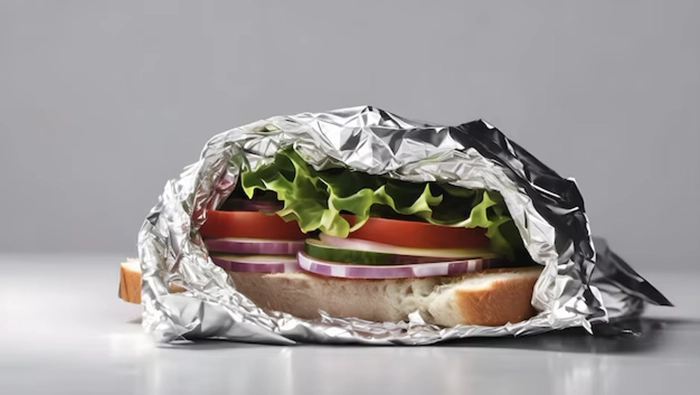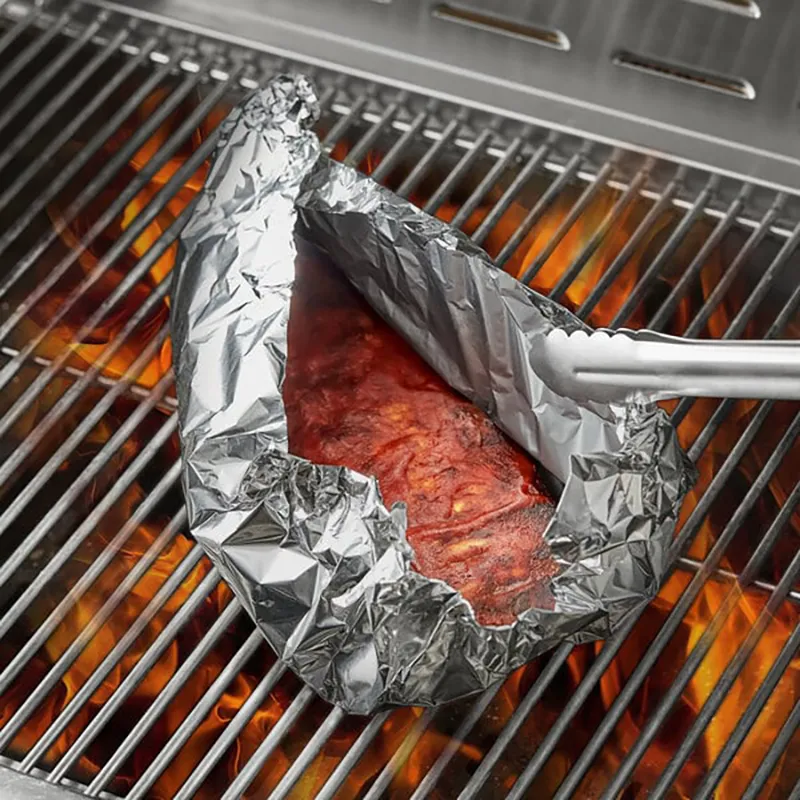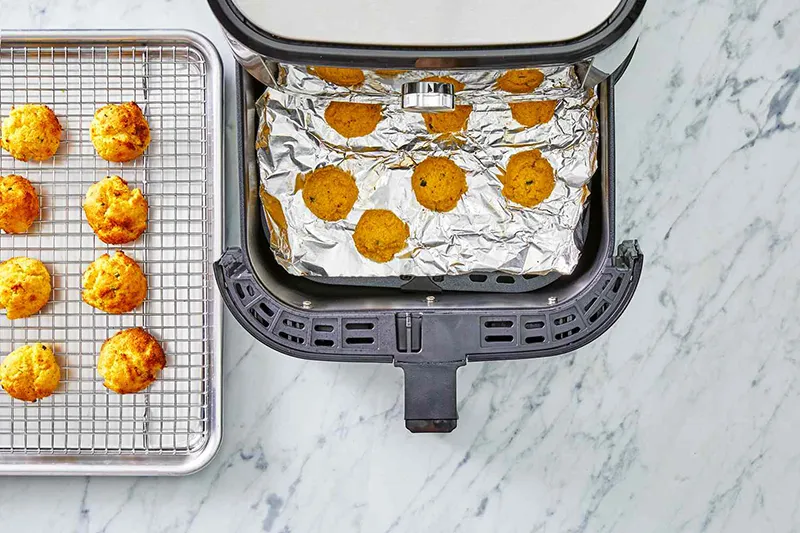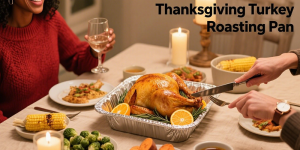Is It Safe To Wrap A Sandwich In Aluminum Foil?
It is safe to wrap sandwiches in foil. This is because foil is a safe food contact material. Aluminum foil is food-grade and meets safety standards. It is produced through a high temperature annealing process, is completely sterile, and will not harbor or breed bacteria.
There are concerns that aluminum can leach into food, especially if the sandwich contains acidic foods such as lemon or ketchup. This may pose health risks, including links to diseases such as Alzheimer’s, Parkinson’s disease, and multiple sclerosis. Therefore, it is recommended to avoid wrapping sandwiches with acidic ingredients in foil.

While foil can help keep sandwiches fresh by preventing moisture loss and air exposure, it may not be as effective as airtight containers. Airtight containers can better prevent drying and maintain the freshness of the sandwich.
So, if the sandwich does not contain acidic ingredients and the foil is food grade, it is safe to wrap the sandwich in foil. However, for optimal preservation and environmental considerations, using airtight containers or other packaging methods may be a better choice.
What Are The Disadvantages Of Aluminum Foil?
As a professional aluminum foil manufacturer, there are some common disadvantages in the production and application of aluminum foil:
Production defects: The manufacturing process of aluminum foil will produce various defects such as dots, lines and surfaces, which are usually caused by problems in the rolling process, foreign body damage and material defects. These defects will affect the quality and performance of the foil.
Permeability problems: Aluminum foil may have pinholes, which will affect its barrier properties and allow oxygen, water vapor and light to penetrate. This is particularly problematic for packaging sensitive items such as pharmaceuticals.
Aluminum leaching: When used in cooking or food packaging, aluminum foil will leach aluminum into food, especially when exposed to acidic or salty foods and high temperatures. This may pose a health risk.
Should I Stop Using Aluminum Foil?
It’s up to you to decide whether to stop using aluminum foil. In the normal use of aluminum foil, as long as you follow the instructions, it will not cause harm to your body.
But some people are still concerned that aluminum may leach into food, especially when it is hot or acidic. Given these issues, you may not want to use aluminum foil. You need to explore safer aluminum foil alternatives, such as beeswax wraps, silicone baking mats, and glass, ceramic or stainless steel containers.
Is It Safe To Store Food In Aluminum Foil In The Fridge?
It is generally safe to put food in aluminum foil and put it in the refrigerator, but there are some things you need to be aware of.
Because aluminum foil is not airtight, it may allow some air to circulate around the food. This can promote bacterial growth, leading to food spoilage and potential health risks. Aluminum foil also does not effectively prevent moisture loss or absorption, which can affect the texture and quality of the food. To better preserve food and keep it safe, it is recommended to use airtight containers or food storage bags.
Can You Put Hot Food On Aluminum Foil?
Yes, you can place hot food on aluminum foil. Generally, it is safe to wrap food in aluminum foil for a short period of time, even if the food is hot. However, it is important to handle hot foil carefully to avoid burns. In addition, it is recommended to avoid using aluminum foil with acidic foods, as the combination of acid and heat can cause the aluminum to leach into the food, which may pose a health risk.

Which Is Better, Butter Paper Or Aluminium Foil?
When comparing butter paper and aluminum foil, they each have advantages and disadvantages depending on the specific use case:
Butter Paper
- Eco-Friendly: Butter paper is biodegradable, making it a more environmentally friendly option compared to aluminum foil, which is non-biodegradable and has a low recycling rate.
- Non-Stick: Butter paper is non-stick, so it can be used in baking and cooking applications where sticking is a concern.
- Not Heat-Resistant: Butter paper is not suitable for high-temperature applications. Due to its wax coating, use in the oven may cause melting or fire hazards.
Aluminium Foil
- Heat Resistant: Aluminum foil has high heat resistance and can be used in high-temperature cooking and baking without melting or causing fire hazards.
- Reflective Properties: Aluminum foil has an excellent ability to reflect heat, which can prevent food from burning.
- Barrier Properties: Aluminum foil has better oxygen and moisture barrier properties, which can maintain the freshness of food.
- Health Concerns: There are concerns that aluminum can leach into food, especially when used with acidic or salty foods, which can pose a health risk.
In conclusion, butter paper is better due to its biodegradability and non-stick properties, but it is not suitable for high-temperature applications. Aluminum foil is better due to its heat resistance, reflective properties and excellent barrier properties, but it does have potential health concerns.
Which Is Better For Food Storage Plastic Or Aluminum Foil?
Plastic and aluminum foil each have their own advantages and disadvantages when it comes to storing food, but overall, plastic is usually a better choice.
Plastic: Plastic containers are effective in keeping out air and moisture, making them particularly suitable for long-term food storage, especially when refrigerated and frozen. There are a variety of plastic containers that are suitable for refrigeration, freezing, and microwave heating. They can handle storage needs at different temperatures, and most plastic containers can be reused, with low long-term costs. In addition, transparent plastic containers make it easy to observe the condition of food and facilitate management.
Aluminum foil: Aluminum foil is suitable for short-term storage or preserving baked food but not for long-term use. Although aluminum foil can be used for freezing, it is inconvenient to use in the microwave, and it cannot be used to store highly acidic or high-salt foods for a long time, otherwise it will react with the food.
Therefore, plastic containers are more suitable for daily food storage. It can provide better sealing, long-term food preservation, and perform better in freezing, refrigeration, etc. However, if it is for short-term storage or needs to be used in the oven, aluminum foil can also be one of the options.
What To Use Instead Of Aluminium Foil?
If you want to reduce or stop using aluminum foil, there are several sustainable and practical alternatives.
Beeswax Wraps
Best for: wrapping food (e.g., sandwiches, fruit, cheese) or covering bowls.
Notes: Not ideal for high-temperature applications, but great for keeping food fresh at room temperature or in the refrigerator.
Parchment Paper
Best for: Baking, roasting, lining pans.
Notes: Does not retain as much moisture as aluminum foil, but is great for cooking delicate foods like fish, baked goods, or roasted vegetables.
Silicone Baking Mats
Best for: Baking and roasting.
Notes: Best for baking; not ideal for storing food.
Glass or Stainless Steel Containers
Best for: Storing food in the refrigerator, freezer, or pantry.
Notes: Heavier and less flexible than aluminum foil, but more environmentally friendly and better for long-term storage.
Plastic Wrap
Best for: Wrapping food for short-term storage.
Notes: Not the best choice for long-term use, but a suitable option for keeping foods like fruit, sandwiches, and leftovers fresh for a day or two.
Why You Shouldn’t Wrap Your Food In Aluminium Foil Before Cooking It?

Wrapping food in foil before cooking can have some disadvantages.
Acidic foods (like tomatoes, citrus, or vinegar-based dishes) can react with aluminum, creating a metallic taste.
Wrapping food tightly in foil can trap steam, resulting in a soggy texture instead of a crispy texture, especially when baking or grilling.
Foil can affect heat circulation, which can lead to uneven cooking in some cases. The exposed side of the food may cook faster, while the wrapped side may not cook as well.
Can I Pack Food In Aluminium Foil?
Yes, you can wrap food in aluminum foil.
Freshness: Aluminum foil can help keep food fresh by sealing and preventing air exposure.
Insulation: It helps keep hot food warm and is suitable for transporting meals.
Lightweight: Aluminum foil is lightweight and easy to carry, making it convenient for picnics.
Versatile: It can be used to wrap sandwiches, baked goods, and even cover plates.
Precautions:
Acidic foods: Avoid wrapping highly acidic foods (such as tomatoes or citrus) directly in aluminum foil, as they will react with the metal and create a metallic taste.
Microwave use: Do not use aluminum foil in the microwave as it can cause sparks and fires.
Is It Safer To Cook With Aluminum Foil Or Parchment Paper?
One of the main safety concerns with aluminum foil is that it can react with acidic or salty foods, causing aluminum to leach into the food. This is especially true at higher temperatures or when the foil comes in direct contact with acidic ingredients such as tomatoes, citrus, or vinegar-based sauces. There are concerns that aluminum exposure may pose health risks, especially if the food in contact with the foil is consumed over a long period of time.
Parchment paper is typically made from wood pulp that is treated with acids to create a non-stick surface. It does not react with acidic foods and does not release any harmful chemicals during cooking. Parchment paper is considered completely safe to use for cooking. It contains no chemicals and does not release anything into the food during cooking. It can also withstand high temperatures up to 420°F (215°C), making it ideal for baking and grilling.



